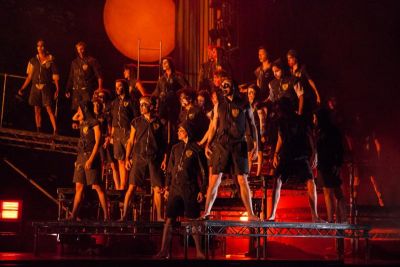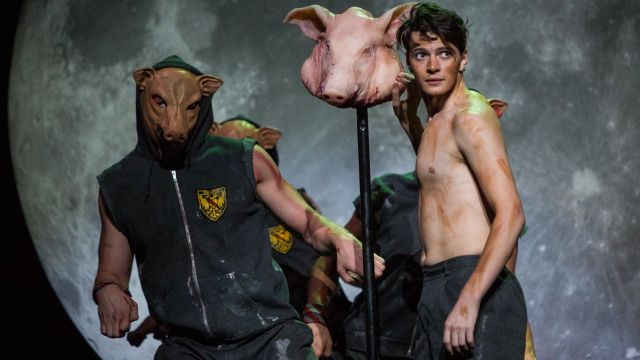Lord Of The Flies
William Golding’s iconic novel is enjoying, along with Orwell’s 1984, something of a resurgence in this strange new era of society we find ourselves embroiled in. Golding’s novel is confronting, and often frightening, as it holds up the mirror to a world driven by power, as well as survival, where the weak and the gentle find little compassion, where the will of the Tribe over-rides the rights of the individual. It is a stark and challenging narrative, crystal clear in its intent and very pertinent today, given what we are seeing overseas.
Matthew Bourne’s strength also lies in confronting us and often jolting us from our comfort zones, but in this production he is less successful than Golding’s novel, and the intent seems muddied and unfocussed a lot of the time.
It’s true that you can’t have your cake and eat it, so if you are going to change the setting (an island) to someplace on land (a warehouse? an abandoned theatre?), and have the boys go willingly, rather than an enforced captivity, and make the time frame NOW (mobile phones and all), then you need to make allowances for those changes in text and character.
The concept is exciting, but the execution is often disappointing and doesn’t seem fully realised.
What is enthralling is the sheer power of the raw physicality and masculinity of the mass onstage. Given that only a handful are actual dancers, and many are youths discovered in workshops around Victoria, it’s a monumental achievement that the production hit the stage at all.
 But, even making allowances, the choreography is largely uninspired even amongst the experienced dancers, and for the newcomers, movement consists largely of marching or box steps or the kind of direction one sees for the masses in an Olympics opening event.
But, even making allowances, the choreography is largely uninspired even amongst the experienced dancers, and for the newcomers, movement consists largely of marching or box steps or the kind of direction one sees for the masses in an Olympics opening event.
For me, Golding’s storytelling and intent is lost in too much repetitive movement that goes nowhere to informing character. It’s all a bit wishy washy after the promise of power in the first five minutes. There are no exceptional performances, no moments when you hold your breath, no exhilaration. If anything there is an emotional disconnect between the stage and the audience in a story that demands the audience/reader becomes part of the action to experience it fully.
Lez Brotherston’s set is evocative and exciting and Chris Davey’s lighting complements the work beautifully, but Terry Davies’ music is anachronistic and not memorable at any time; a first act full of Caribbean type calypso music does nothing to denote mood or move story forward.
Scott Ambler has every chance to astound us but doesn’t, though ultimately it is Matthew Bourne’s baby, and it’s noteworthy that, since his breakthrough Swan Lake, his productions have become exponentially less interesting.
If this were a production only for schools, I would be standing and cheering that our children were being exposed to different storytelling. But it isn’t. It’s at the State Theatre for an audience of theatre-goers and dance lovers and, as such, it’s a disappointment.
Coral Drouyn
Photographer: Mark Gambino
Subscribe to our E-Newsletter, buy our latest print edition or find a Performing Arts book at Book Nook.

